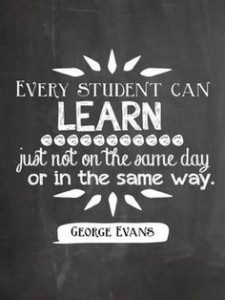 I drifted through middle and high school. I was quiet, I did my homework, and I didn’t cause any trouble. I didn’t try hard and most teachers didn’t push me; except a few. These teachers believed I had more to offer than I showed and they worked to make me see it as well. They were an inspiration for me and to me. Throughout my college and graduate years I was blessed with many teachers who worked hard to create in me a love of learning and of school. Those teachers, those who cared, who listened, and who taught with a love of their subject, inspired me to do the same. I found that teaching English came naturally to me. I realized that I had an innate ability to relate to those mysterious teenage years through which my students voyaged. I have been lucky to combine that ability with a love of teaching the English language and the written word. My career path has taken me through the public schools, into the not-for-profit world, and engaged me with one-on-one tutoring, all of which combined to make me a teacher who is able to teach a rigorous curriculum while creating an atmosphere of learning, engagement, and success.
I drifted through middle and high school. I was quiet, I did my homework, and I didn’t cause any trouble. I didn’t try hard and most teachers didn’t push me; except a few. These teachers believed I had more to offer than I showed and they worked to make me see it as well. They were an inspiration for me and to me. Throughout my college and graduate years I was blessed with many teachers who worked hard to create in me a love of learning and of school. Those teachers, those who cared, who listened, and who taught with a love of their subject, inspired me to do the same. I found that teaching English came naturally to me. I realized that I had an innate ability to relate to those mysterious teenage years through which my students voyaged. I have been lucky to combine that ability with a love of teaching the English language and the written word. My career path has taken me through the public schools, into the not-for-profit world, and engaged me with one-on-one tutoring, all of which combined to make me a teacher who is able to teach a rigorous curriculum while creating an atmosphere of learning, engagement, and success.
The truest thing one can say about human beings is that we are continually learning. Mark Twain said that “anyone who stops learning is old, whether twenty or eighty. Anyone who keeps learning stays young. The greatest thing you can do is keep your mind young.” Much of my personal and professional satisfaction has been the direct result of my own continual quest to learn, develop, and grow. The inspiration to learn, to investigate the world as it unfolds is something I want to instill in my students. In order to do this I need to think specifically about what constitutes the best learning environment. Adolescent students are most successful in classrooms that are focused and safe “sharing” environments. Where students feel free to express their ideas and to make mistakes. A place where their prior knowledge and interests are taken into consideration and collaborative activities inspire critical literacy. My teaching is most effective in these spaces as well. I am a better teacher when I immerse myself in learning along with my students and when I reflect on my own teaching experiences to see how I can be better. No matter how many times I have taught something, there is always the possibility of learning from it.
My teaching reflects the importance I place on observing, learning, and reflecting. I hold my students to high standards and in order to achieve their goals I encourage them to think critically and openly about the people, places, ideas, and politics around them. I expect them to support their beliefs through their actions and words (both written and oral. My goal is not to simply teach a subject but to teach students how to critically examine their world, both past and present, and make wise choices about their lives. The beauty of teaching English lies in its infinite creativity and application to critical thinking; however, a major pitfall of this subject is its subjectivity. It is important to teach with enough guidance to allow for proper interpretation of a text but with the freedom to allow students their own personal opinion. The classroom, therefore, becomes a student-centered space where students take the lead in class activities, lead their own discussions, do their own research, and debate with wisdom and knowledge about current events while I, as teacher, listen, guide, and respond.
Stephen Brookfield wrote in his book The Skillful Teacher (1990), “Teaching is about making some kind of dent in the world so that the world is different than what it was before you practiced your craft. Knowing clearly what kind of dent you want to make in the world means that you must continually ask yourself the most fundamental evaluative questions of all–What effect am I having on students and on their learning?”. So, what kind of teacher do I want to be? What is the dent I want to make? My goal for my students is the same I have for my own children. I want to encourage them to become independent life-long learners, to develop critical thinking skills, and use those skills to gain an understanding of the world we live in.